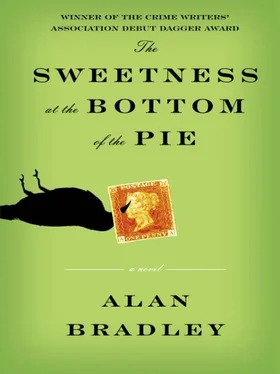Alan Bradley - The Sweetness at the Bottom of the Pie
Здесь есть возможность читать онлайн «Alan Bradley - The Sweetness at the Bottom of the Pie» весь текст электронной книги совершенно бесплатно (целиком полную версию без сокращений). В некоторых случаях можно слушать аудио, скачать через торрент в формате fb2 и присутствует краткое содержание. Жанр: Старинная литература, на английском языке. Описание произведения, (предисловие) а так же отзывы посетителей доступны на портале библиотеки ЛибКат.
- Название:The Sweetness at the Bottom of the Pie
- Автор:
- Жанр:
- Год:неизвестен
- ISBN:нет данных
- Рейтинг книги:3 / 5. Голосов: 1
-
Избранное:Добавить в избранное
- Отзывы:
-
Ваша оценка:
- 60
- 1
- 2
- 3
- 4
- 5
The Sweetness at the Bottom of the Pie: краткое содержание, описание и аннотация
Предлагаем к чтению аннотацию, описание, краткое содержание или предисловие (зависит от того, что написал сам автор книги «The Sweetness at the Bottom of the Pie»). Если вы не нашли необходимую информацию о книге — напишите в комментариях, мы постараемся отыскать её.
The Sweetness at the Bottom of the Pie — читать онлайн бесплатно полную книгу (весь текст) целиком
Ниже представлен текст книги, разбитый по страницам. Система сохранения места последней прочитанной страницы, позволяет с удобством читать онлайн бесплатно книгу «The Sweetness at the Bottom of the Pie», без необходимости каждый раз заново искать на чём Вы остановились. Поставьте закладку, и сможете в любой момент перейти на страницу, на которой закончили чтение.
Интервал:
Закладка:
Parts of this sequence of events I had suspected for some time, and even though I hadn't yet put together the remaining facts, I had already verified Pemberton's presence in Doddingsley by my telephone call to Mr. Cleaver, the innkeeper of the Jolly Coachman.
In retrospect, it all seemed fairly simple.
I stopped thinking for a moment to listen to my breathing. It was slow and regular as I sat there with my head resting on my knees, which were still pulled up in an inverted V.
At this moment I thought of something Father had once told us: that Napoleon had once called the English “a nation of shopkeepers.” Wrong, Napoleon!
Having just come through a war in which tons of trinitrotoluene were dumped on our heads in the dark, we were a nation of survivors, and I, Flavia Sabina de Luce, could see it even in myself.
And then I muttered part of the Twenty-third Psalm for insurance purposes. One can never be too sure.
Now: the murder.
Again the dying face of Horace Bonepenny swam before me in the dark, its mouth opening and closing like a landed fish gasping in the grass. His last word and his dying breath had come as one: “ Vale ,” he had said, and it had floated from his mouth directly to my nostrils. And it had come to me on a wave of carbon tetrachloride.
There was no doubt whatsoever that it was carbon tetrachloride, one of the most fascinating of chemical compounds.
To a chemist, its sweet smell, although very transient, is unmistakable. It is not far removed in the scheme of things from the chloroform used by anesthetists in surgery.
In carbon tetrachloride (one of its many aliases) four atoms of chlorine play ring-around-a-rosy with a single atom of carbon. It is a powerful insecticide, still used now and then in stubborn cases of hookworm, those tiny, silent parasites that gorge themselves on blood sucked in darkness from the intestines of man and beast alike.
But more importantly, philatelists use carbon tetrachloride to bring out a stamp's nearly invisible watermarks. And Father kept bottles of the stuff in his study.
I thought back to Bonepenny's room at the Thirteen Drakes. What a fool I had been to think of poisoned pie! This wasn't a Grimm's fairy tale; it was the story of Flavia de Luce.
The pie shell was nothing more than that: just a shell. Before leaving Norway, Bonepenny had removed the filling, and stuffed in the jack snipe with which he planned to terrorize Father. That was how he'd smuggled the dead bird into England.
It wasn't so much what I had found in his room as what I hadn't found. And that, of course, was the single item that was missing from the little leather kit in which Bonepenny carried his diabetic supplies: a syringe.
Pemberton had come across the syringe and pocketed it when he rifled Bonepenny's room just before the murder. I was sure of it.
They were partners in crime, and no one would have known better than Pemberton the medical supplies that were essential to Bonepenny's survival.
Even if Pemberton had planned a different way of dispatching his victim—a stone to the back of the head or strangulation with a green willow withy—the syringe in Bonepenny's luggage must have seemed like a godsend. The very thought of how it was done made me shudder.
I could imagine the two of them struggling there in the moonlight. Bonepenny was tall, but not muscular. Pemberton would have brought him down as a cougar does a deer.
Out comes the hypodermic and into the base of Bonepenny's brain it goes. Just like that. It wouldn't take more than a second, and its effect would be almost instantaneous. This, I was certain, was the way in which Horace Bonepenny had met his death.
Had he ingested the stuff—and it would have been a near impossibility to force him to swallow it—a much larger quantity of the poison would have been required: a quantity which he would have promptly vomited.
Whereas five cc's injected into the base of the brain would be sufficient to bring down an ox.
The unmistakable fumes of the carbon tetrachloride would have been quickly transmitted to his mouth and nasal cavities as I had detected. But by the time Inspector Hewitt and his detective sergeants arrived, it had evaporated without a trace.
It was almost the perfect crime. In fact it would have been perfect if I had not gone down into the garden when I did.
I hadn't thought about this before. Was my continued existence all that stood between Frank Pemberton and freedom?
There was a grating noise.
I could not tell which direction it was coming from. I swiveled my head and the noise stopped instantly.
For a minute or more there was silence. I strained my ears but could hear only the sound of my own breathing, which I noticed had become more rapid—and more jagged.
There it was again! As if a piece of lumber were being dragged, with agonizing slowness, across a gritty surface.
I tried to call out “Who's there?” but the hard ball of the handkerchief in my mouth reduced my words to a muffled bleat. At the effort, my jaws felt as if someone had driven a railway spike into each side of my head.
Better to listen, I thought. Rats don't move lumber, and unless I was sadly mistaken, I was no longer alone in the Pit Shed.
Like a snake, I moved my head slowly from side to side, trying to take advantage of my superior hearing, but the heavy tweed binding my head muffled all but the loudest of sounds.
But the grating noises were not half as unnerving as the silences between them. Whatever it was in the pit was trying to keep its presence unknown. Or was it keeping quiet to unnerve me?
There was a squeak, then a faint tick , as if a pebble had fallen onto a large stone.
As slowly as a flower opening, I stretched my legs out in front of me, but when they met with no resistance, I pulled them back up beneath my chin. Better to be coiled up, I thought; better to present a smaller target.
For a moment, I focused my attention on my hands, which were still lashed behind me. Perhaps there had been a miracle; perhaps the silk had stretched and loosened, but no such luck. Even my numbed fingers could sense that my bonds were as tight as ever. I hadn't a hope of getting free. I really was going to die down here.
And who would miss me?
Nobody.
After a suitable period of mourning, Father would turn again to his stamps, Daphne would drag down another box of books from the Buckshaw library, and Ophelia would discover a new shade of lipstick. And soon—too painfully soon—it would be as if I had never existed.
Nobody loved me, and that was a fact. Harriet might have when I was a baby, but she was dead.
And then, to my horror, I found myself in tears.
I was appalled. Brimming eyes were something I had fought against as long as I could remember, yet in spite of my bound-up eyes I seemed to see floating before me a kindly face, one I had forgotten in my misery. It was, of course, Dogger's face.
Dogger would be desolate if I died!
Get a grip, Flave… it's just a pit. What was that story Daffy read us about a pit? That tale of Edgar Allan Poe's? The one about the pendulum?
No! I wouldn't think about it. I wouldn't!
Then there was the Black Hole of Calcutta in which the Nawab of Bengal had imprisoned a hundred and forty-six British soldiers in a cell made to hold no more than three.
How many had survived a single night in that stifling oven? Twenty-three, I remembered, and by morning, stark raving mad—every last one of them.
No! Not Flavia!
My mind was like a vortex, spinning… spinning. I took a deep breath to calm myself, and my nostrils were filled with the smell of methane. Of course!
The pipe to the riverbank was full of the stuff. All it needed was a source of ignition to set it off and the resulting explosion would be talked about for years.
Читать дальшеИнтервал:
Закладка:
Похожие книги на «The Sweetness at the Bottom of the Pie»
Представляем Вашему вниманию похожие книги на «The Sweetness at the Bottom of the Pie» списком для выбора. Мы отобрали схожую по названию и смыслу литературу в надежде предоставить читателям больше вариантов отыскать новые, интересные, ещё непрочитанные произведения.
Обсуждение, отзывы о книге «The Sweetness at the Bottom of the Pie» и просто собственные мнения читателей. Оставьте ваши комментарии, напишите, что Вы думаете о произведении, его смысле или главных героях. Укажите что конкретно понравилось, а что нет, и почему Вы так считаете.












